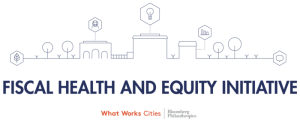New program to help cities tackle fiscal recovery with an emphasis on equity

Over the past five months, city leaders have applied laser-like focus to protecting residents’ health. And for good reason: COVID-19 has already claimed nearly three times the number of American lives as were lost during the Vietnam War. Yet, if there’s anything that threatens to approach the devastation of the pandemic’s physical toll, it’s the fiscal aftershocks — and the crippling effects they might have on cities and, especially, already-gaping racial divides.
In fact, 90 percent of U.S. cities expect revenue shortfalls in the wake of COVID-19 and, as a result, more than half of them expect to cut public safety spending and a quarter of them plan to lay off city employees, according to a survey conducted by the National League of Cities and the U.S. Conference of Mayors. And even prior to the pandemic shining a light on this country’s systemic racial disparities, the majority of mayors were worried about issues of inclusivity — particularly in relation to Black residents and those living in poverty.
That’s why Bloomberg Philanthropies, through its What Works Cities Initiative, is launching the Fiscal Health and Equity Initiative — to provide expert insights and peer-to-peer learning as mayors and city financial leaders navigate complicated and critical fiscal decisions and implement new and equity-centered interventions to help them recover financially from COVID-19.
“This initiative is the latest in Bloomberg Philanthropies’ continued effort to help cities use data, creativity, and collaboration to tackle their biggest challenges,” says What Works Cities Executive Director Simone Brody. “On the heels of COVID-19 and the civil-rights protests across the country, there are no bigger challenges for cities than addressing the budget and equity crises. Data and evidence will, more than ever, play a critical role in how cities build back stronger and more inclusively.”
The 15-month online program, which is open to mayors and senior financial leaders (e.g. chief financial officers and budget directors) from cities with populations between 100,000 and 1 million, will bring these city leaders together with the nation’s top municipal finance and equity experts to learn cutting-edge fiscal interventions and advance new approaches that benefit their cities.
“The current economic crisis manifesting under COVID-19 is unprecedented and presents a host of different challenges [than previous crises],” explains Boston College Professor Lourdes German, who is Director of The Civic Innovation Project and pedagogical lead for the initiative. “Cities have to keep running with no sense of when public health and consumption patterns will return to normal levels — and this is occurring in an environment where federal stimulus aid has been unpredictable.”
On top of that, an unfortunate reality of COVID-19 is that “communities of color have, overwhelmingly, borne the brunt of the pandemic — health-wise and economically, according to Ryan Bowers, Co-founder of Activest and equity advisor for the initiative. “This disparate impact on these communities — particularly Black communities — has been profound,” he says.
Those participating in the initiative will work with each other and experts to find fiscal approaches to help bridge these divides. “Just as cities have begun to consider the carbon footprint of their municipal operations, they must also consider the equity footprint,” says Napoleon Wallace, Co-founder of Activest and equity advisor for the initiative. “In what ways do a city’s policies, practices, and principles create disparate outcomes — positive and negative — among its citizenry and staff? That’s a simple question that can have broad implications when considering changes to revenues, expenditures, and borrowing.”
To get through COVID-19, leaders are going to have to focus on both residents’ physical and their fiscal health. The Fiscal Health and Equity Initiative aims to provide them the support and guidance they’ll need to get through this crisis, be better prepared for the next, and support their residents through it all.
“I know from my experience managing New York City’s finances after 9/11 how complex it is to lead a city through a financial crisis,” says City University of New York’s Marc Shaw, who is an advisor to the initiative and served as the First Deputy Mayor and Deputy Mayor of Operations for then-New York City Michael Bloomberg. “Having the support of experts across the country, and from a group of peers, will be invaluable to cities at this moment in time.”
Learn more about the Fiscal Health and Equity Initiative—and apply for the program by Monday, August 31—here.


